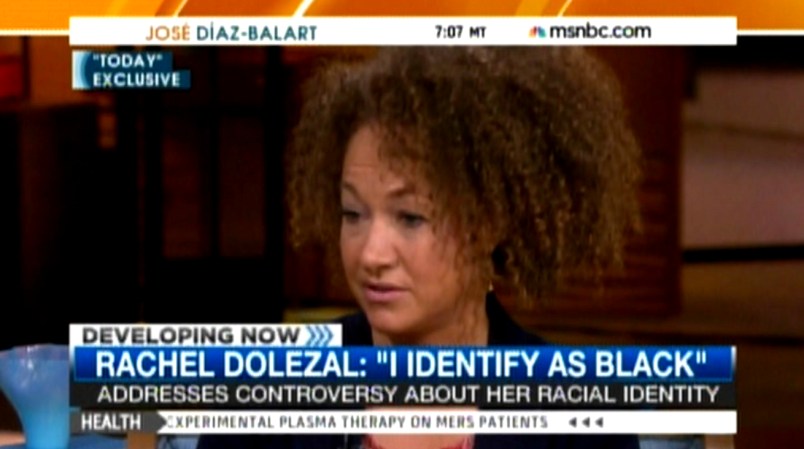This post has been updated.
Rachel Dolezal on Tuesday morning addressed reports that she has been pretending to be black for the first time since she resigned from her position as president of the Spokane chapter of the National Association for the Advancement of Colored People (NAACP).
“I identify as black,” she said on NBC’s “The Today Show” when Matt Lauer asked if she is an African-American woman.
Dolezal told Lauer that she did not always identify as black, but began thinking of herself that way at a young age. She said that when she was about five years old, she began drawing herself with a brown crayon, not a peach one.
“That was how I was portraying myself,” she said.
When he asked when she began “deceiving” people, she said she took exception with that.
“It’s a little more complex than me identifying as black or answering a question of, ‘Are you black or white?'” she said.
Dolezal said that she was first identified as “transracial” in a news article while she was working in North Idaho on human rights issues. She was then identified in the news as a “biracial woman” when “opposition to some of the human rights work I was doing came forward.”
She said that she was identified as black when she allegedly became the target of hate crimes, Dolezal said.
“I never corrected that,” Dolezal said of the news reports’ varying identifications.
When asked why she never corrected the reports, Dolezal said, “It’s more complex than being true or false in that particular incident.”
She said her self-identification as black “solidified” when she won custody of her adopted brother, Izaiah.
“He said, ‘You’re my real mom,'” she told Lauer. “And for that to be something that is plausible, I certainly can’t be seen as white and be Izaiah’s mom.”
Lauer asked Dolezal if she darkens her complexion purposefully.
“I certainly don’t stay out of the sun,” she responded, adding that she does not “put on blackface as a performance.”
“This is not some freak, ‘Birth of a Nation,’ mockery, blackface performance. This is on a very real, connected level,” she said. “I’ve actually had to go there with the experience, not just the visible representation, but with the experience.”
Dolezal came under scrutiny when local news outlets reported that she had been pretending to be black. She had said numerous times that she is of African-American descent, but her parents say that she is white.
Dolezal said that the “timing” of her parents public statements about her race was a “shock,” but she acknowledged that she knew she would have had to address the topic eventually.
“I did feel that at some point I would need to address the complexity of my identity,” she said.
When asked if she would make the same choices again, Dolezal said she would.
“As much as this discussion has somewhat been at my expense recently, in a very, sort of, viciously inhumane way,” she said, “the discussion’s really about what it is to be human, and I hope that that can really drive at the core of definitions of race, ethnicity, culture, self-determination, personal agency, and ultimately empowerment.”
Watch the “Today Show” interview via NBC:







I really don’t see the problem with her saying she feels a cultural identification with blacks (or whites or Asians or First Nations or anything else). If she had simply been honest about who her parents were this would be a big fat nothing. Given that she was hardly a major national figure, but simply President of a local chapter in a fairly small metro area, the story hardly merits the attention it’s been getting.
“I certainly don’t stay out of the sun,” she responded, adding that she does not "put on blackface as a performance."
Well, if not for performance, then why do you put it on?
It’s also garnering a lot of attention because of the many hate crimes that she has reported over the years don’t add up – that’s according to the various police reports. Also the fact she sued a university claiming they discriminated against her because she was white – that was before she started living life as a black person.
Personally, I don’t really have much issue with her identifying with black Americans as fighting for justice is a very noble endeavor. However, it’s the lies about hate crimes, the fake hate letters sent to her, etc., and the seat on the police commission she obtained in part because she told them she is black. It’s those sorts of things I find really unfortunate in this saga. I actually believe she might have mental health issues, certainly issues with her parents and her upbringing – but that’s between her and her parents. If she does have mental health issues, I sincerely hope she seeks and receives proper treatment.
Yeah, she likely has mental health issues, but so what? At the end of the day she is a minor figure-head of a small-city branch of an NGO. So why is this a #1 national story?
Girl, please!